
Sponsored Ads
|
» Home
» Bilingual » Branka Kandic-Splavski and her Croatian fairy tales as medicine - Bajka kao lijek
» Home
» Croatian Language » Branka Kandic-Splavski and her Croatian fairy tales as medicine - Bajka kao lijek
» Home
» People » Branka Kandic-Splavski and her Croatian fairy tales as medicine - Bajka kao lijek
» Home
» Education » Branka Kandic-Splavski and her Croatian fairy tales as medicine - Bajka kao lijek
» Home
» Community » Branka Kandic-Splavski and her Croatian fairy tales as medicine - Bajka kao lijek
» Home
» Charity » Branka Kandic-Splavski and her Croatian fairy tales as medicine - Bajka kao lijek
| Branka Kandic-Splavski and her Croatian fairy tales as medicine - Bajka kao lijek |
| By Vladimir Mihajlović |
Published
06/29/2011
|
Bilingual , Croatian Language , People , Education , Community , Charity
|
Unrated
|
|
|
|
Fairy tales therapy - Tales with a scent of vanilla, cinnamon and dream
Branka Kandić-Splavski
BAJKA KAO LIJEK
PRIČE S MIRISOM VANILIJE, CIMETA I SNA
Bila sam student medicine.
Na vježbama iz hematologije,
kraj mikroskopa, stajao je mali,
gumeni Šiljo, kojeg je,rekli su mi,
jedno dijete držalo znojnim dlanom
dok se borilo...
Zauvijek mi se u sjećanje urezao i
prozor s rešetkama na katu bolnice,
s kojeg su me ispraćale male,
ćelave glave s ogromnim očima.
Nisam im mogla pomoći da izađu van,
ali sam, evo, pokušala ući k njima
unutra...
Predgovor moje knjige ANDREINA ŠKOLJKA.
|
FAIRY TALE AS A MEDICINE
TALES WITH A SCENT OF VANILLA, CINNAMON AND DREAM
I was a student of medicine.
During our hematology trainings,
next to the mikroscope, there was a small,
rubber Goofy, that had been, I was told, held by a child's sweaty palm
while struggling for life.
The window with bars on a hospital ward,
out of which small, bold little heads with their huge eyes used to see me to the door
is carved forever in my memory as well.
I couldn' t help them to get out,
but in this way I have tried to reach them
within...
Foreword to my book ANDREA'S SHELL
|
Rođena sam,živim i radim u Osijeku, zelenom gradu na sivoj, pjeskonosnoj rijeci Dravi, na sjeveru Hrvatske.
Majka sam dvojice sinova - najljepših na svijetu. Po zanimanju sam liječnik, specijalist obiteljske medicine, a „po duši“ bajkopisačica.
Godine 2004.objavom moje prve knjige Andreina školjka, moj se osobni i profesionalni život posve promijenio:
Jedna moja pacijentica je umirala od posljedica karcinoma mozga. Nije se više mogla ni micati,niti govoriti i tek je nepomično ležala komunicirajući samo očima.
Bila sam joj došla u kućnu posjetu. Što reći i kako prići ljudskom biću u takovoj patnji? Gledale smo se dugo, dugo, a onda sam se sjetila svoje tek objavljene knjige koju sam slučajno imala pri ruci. Otvorila sam stranicu prve od 14 priča u njoj, i počela joj čitati. I dolazila sam dan za danom, sa novom pričom...
Nismo došle do kraja knjige. Stigle smo samo do desete priče, ali nikada neću zaboraviti zahvalnost, ljubav i, čak, sreću u očima te žene dok su je riječi priče, bar za kratko, odnosile u neki daleki i ljepši svijet. Neću zaboraviti ni suze na njezinim obrazima. - te najdirljivije točke na krajevima čitanja...
Poslije su članovi obitelji drugih bolesnika počeli dolaziti sa željom da se i njima čita, te je tako nastao dvogodišnji projekt: Lijekovi od lijepih riječi.
Moje prijateljice i volonteri (a među njima i puno osoba sa invaliditeTom) išli smo bolesnima, te im uz uzglavlja,u kućama ili u bolnicama, čitali priče iz knjige. Kao nekada, kako su činili bake, majke i očevi.
|
I was born and still have been living and working in Osijek, a green city by the grey, sandy river of Drava in the north-east of Croatia.
A mother of two sons-the greatest in the world, a GP in Osijek Outpatient clinic, specialist in family medicine and, in my soul, a fairy tales writer.
In 2004 after my first book ANDREA'S SHELL had been published my personal and professional life took a new direction:
One of my patients was dying of brain cancer. She was no longer able to move, or speak, she was laying motionless and communicated only with her eyes.
I used to make homecalls and was always troubled what to say and how to aproach a human being in such endless suffering. By chance, once, I had my book with me and I spontaniously started to read out of it. I kept coming for days, always with a new story...
We didn't finish the book. We reached the tenth story, only; but I will never forget gratitude, love and, even, happiness in the eyes of that woman while the words of my stories, even for a short while, carried her to a distant but more pleasant world. Neither will I forget the tears on her cheeks, those most touching fullstops ever...
After a while, some family members of other patiens expressed the wish to come and read to their beloved and people in need. That resulted in a two-year project Fairy tales therapy - Drugs of caring words.
A group of friends and volunteers (among them many disabled people) visited the sick in their homes, at hospitals, sitting at their bedsides and reading in the ways, a long time ago, their grandmothers, mothers and fathers used to do.
| 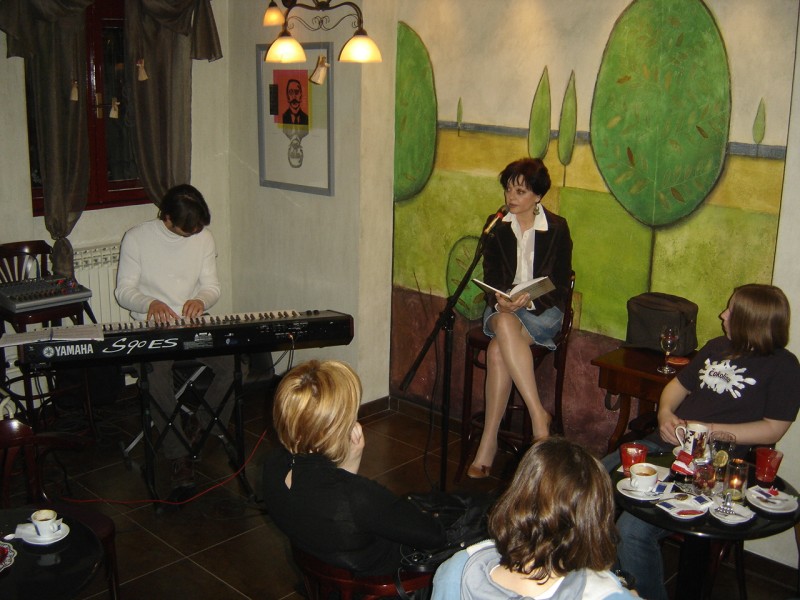 Bajka izlazi iz školjke
Fairy tale leaves the shell
Godine 2006 dobila sam na dar malo prenosivo kazalište. Dala sam izraditi lutke za jednu od bajki (Supuž puža) te je adaptirala za čitanje uz lutkarsku predstavu s kojom sam išla bolesnoj djeci u domove, škole i lječilišta.
Ulaznica se „otplaćivala“ tako što su djeca od gline izrađivala puževe u čije su kućice ušaputala poruke ljubavi i trebala ih pokloniti svojim najboljim prijateljima.
|
In 2006 I got a present a small transportable theatre stage. I let create dolls for my fairy tale
Co-snail of a snail which was read during the performance. I visited sick children in recovery hospitals and homes.
Those children made their „tickets“-little clay snails, in which houses they put personal messages and then presented them to their best friends.
| Lutkarsko mini-kazalište i bajka Supuž puža
Transportable theatre and Co-snail of the snail
Godine 2009. osnovala sam udrugu Palia-Centar koja se bavi promicanjem boljih medicinskih, socijalnih, humanih prava terminalnih bolesnika, svih uzrasta.
Da bi educirala građanstvo o pravu i potrebi za dostojanstvenijom njegom u životima teško bolesnih osoba, udruga je 2010 g. opet posegnula za bajkom.
Ovaj put je to bila bajka Ogledalo (iz knjige Andreina školjka) koju smo „pretočili“ u kazališnu predstavu, ali u toj su predstavi sudjelovali i bolesnici(djeca i odrasli)iz cijelog grada, sudjelovali su i volonteri i medicinari i profesionalni glumci i vrtići i škole...
|
In 2009 group of enthusiasts and myself founded a NGO Palia-Center with the aim of promoting better medical, social and human rights of all cathegories of terminal patients.
In the process of catching the public ear and eye, and informing and educating the society about the patients' rights and neccessity for dignified care in the lives of severely sick people the fairy tale idea once again served as a bridge.
This time it was thr fairy tale The mirror (from Andrea's shell) which was created as an imaginative play of many patients, volonteers, medical stuff,professional actors, athletes, kindergarten and school children as well seniors.
| 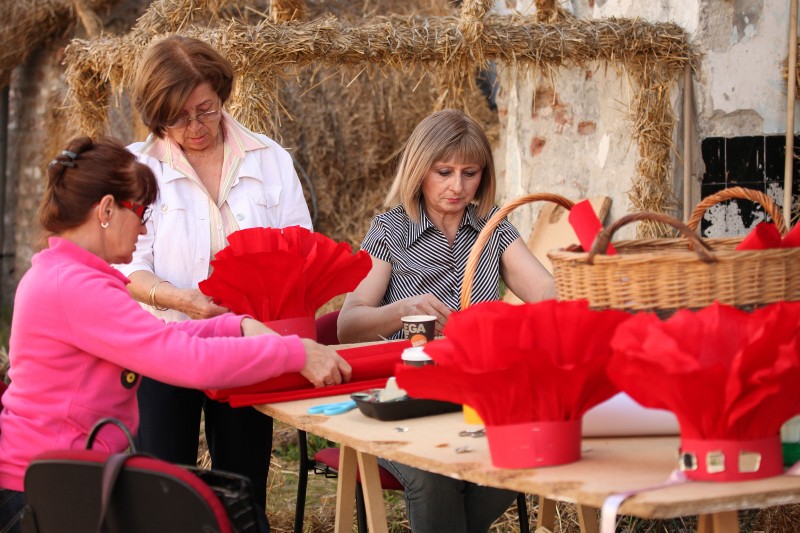 Izrada kostima u art-radionici za onkološke bolesnice
Art-workshop: oncological patients make costumes
Male ruke izrađuju kulise od slame
Little hands produce straw scenery
Udruga Palia-Centar ima art-radionice u kojima su onkološki bolesnice šili, krojili i izrađivali kostime za plesače u predstavi, a plesači su bili i djeca sa Downovim sindromom. Kulise u predstavi izradila su od slame djeca liječena od leukemije i malignoma; glazbu su napisali amateri-volonteri, tehnički suport su dali članovi liječeni od ovisnosti o drogama... Sudjelovala su djeca iz vrtića, osnovnih škola, studenti, umirovljenici, a sve su oblikovali i na završnu scenu postavili profesionalci Glumačke akademije.
Nakon 7 mjeseci priprema, to je bila predstava za pamćenje u Hrvatskom narodnom kazalištu u Osijeku.
Najmlađa učesnica je imala samo 3 godine i rekla je „da pleše za svog bolesnog djeda,da mu bude bolje“.
|
In Palia-Center various art-workshops supplied costumes, scenery and music, and the creators were patients with leukemia, malignoma, children with Down syndrome and some proffessionasl from Art Academy in Osijek.
After seven months of work this play at Croatian national theatre became a great success.
The youngest participant a girl of three said that she was dancing for her sick grandpa
„to make him feel better.“
| 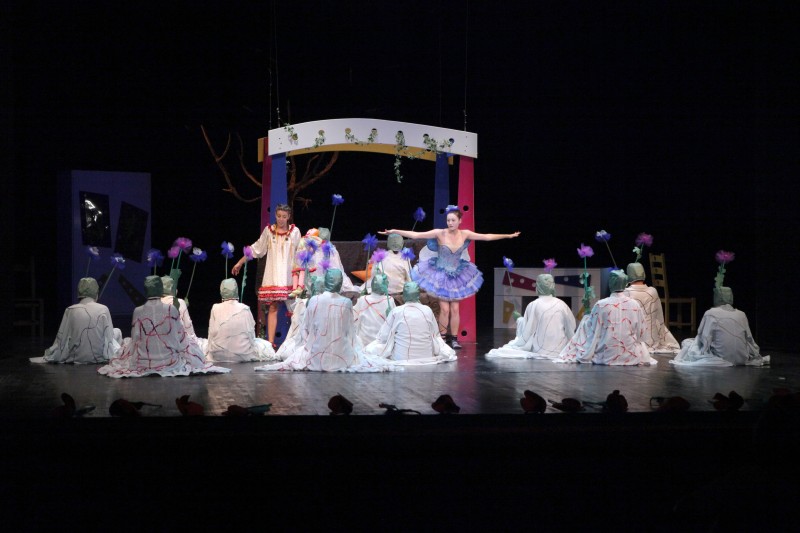 Scena iz predstave Ogledalo u HNK Osijek
A scene from the play The Mirror in Croatian National Theatre, Osijek
Ove godine opet priređujemo novu predstavu, novu bajku. Sudjelovati može tko god želi, umijećem koje ima.Ili samo svojim prisustvom, druženjem.
Neki neće doživjeti završnu izvedbu, ali sati provedeni u zajedničkom „materijaliziranju“ teksta bajke u pokret, scenu, ples, pjesmu, jesu sati u kojima bolesna osoba odlazi od svoje bolesti i živi u lijepom i svjetlucavom i (eto) stvarnom svijetu bajke.
Šteta što se zaboravilo na njihovu istinsku vrijednost, ljekovitost i moć.
|
In this year we'll have a new play, a new fairy tale. Everybody is invited to participate with skills they have but also with their encouragement and presence.
Some of them won't live to attend the opening night but their time invested in mutual „materilising“ the text into dancing, singing and performing gives them some retreat from their illness and worries and possible recovery in the fantasy world.
It is a great pitty that we have almost forgotten the healing potentials and power of fairy tales
and their faith in recovery and well-being.
| 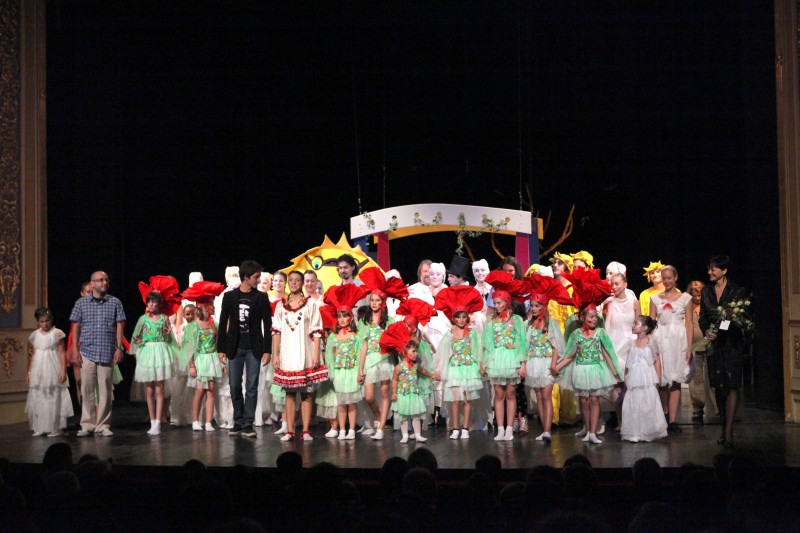 Završni naklon učesnika
All participants greet the audience
Moja druga knjiga zove se Malene stope od sedefa, a treća je Paučica. Sve su zbirke bajkovitih priča.
Kakve su, zapravo, te priče, možda je najbolje ocijenio Arsen Dedić, svojim poznatim, pjesničkim stilom, u pogovoru treće zbirke od deset „neo-bajki“ knjige Paučica:
Ima da te nema
O ovim neo-bajkama moglo bi se govoriti jedino njihovim jezikom. To nije jezik svakodnevnice, jezik televizora, jezik uličarki i uličara, politički jezik… pa ni jezik književnosti na kakav su nas navikavali.
To je jezik sna.
To je potraga za riječima
Isljeđivanje govora mržnje.
Moglo bi se za ovo naći i kakva mudra i opravdana riječ kritičara, koji ja nisam.
Javljam se za riječ jedino kao suučesnik i štovatelj.
U istoj smo neprekidnoj potrazi za ljubavlju, čistotom, morem, dobrotom, „cvjetnim aranžmanom“, voćem, povrćem i melšpajzom našeg djetinjstva.
Autorica nalazi i pronalazi nove riječi, kojima jedino može opisati svoj bijeg u bezgrešno.
Nazvao bih (na svoj način) ovo pismo „nadrealizmom po mjeri čovjeka“.
Branki uz rukoljub
Arsen Dedić
|
Further fairy tales are collected in two more books: TINY MOTHER – OF-PEARL STEPS and THE SPIDERESS
What are these tales in fact speculates Arsen Dedić in his poetic manner covering the ten
„neo-fairy“tales from The Spideress:
.....“It is not a language of everyday communication, political situations or literature in its routine frames...
...It is a search for words...
...It is an escape into the immaculate...
This is the language of dreams.“
To Branka with hand-kiss
Arsen Dedić
| 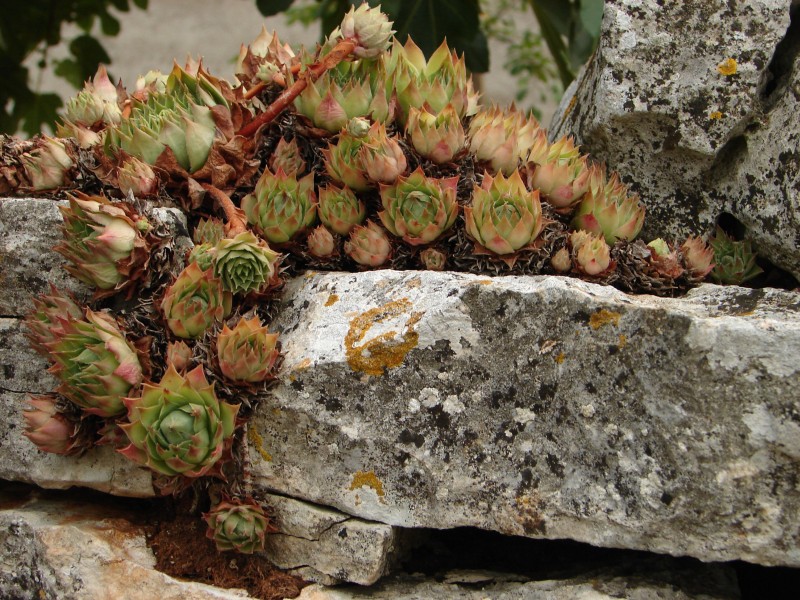 Zid - Wall
A sada, slijedi priča sa mirisom soli, ljekovitog bilja i obrisa sna.
ZID
Tik uz more nalazi se kameni zid prekriven žućkastim lišajevima. Kao plišem.
Iz jedne od njegovih pukotina prsnule su grane kapara i nadvile se nad morem baš da će srknuti malo slane pjene. Na zid je nekoć netko stavio oveći plavi lonac pun zemlje u kojem su nikli i evo, ispuzali karminasti divlji karanfili, pa naširokim pramenovima slatkasta mirisa obgrljuju cijelu uvalu.
Kroz uske kamene proreze vješto se provlači jedan gipki gušter- čuvar svih tih toplih kocki. Redom ih obilazi, mjerka, podupire i vječno poravnava malenim lepezastim nožicama. Podno zida u moru, poslagali se crni školjkasti pupoljci daganja i kao sjemenke nekog čudnog morskog suncokreta,nagurani i oštrousti, kroz sloj bibavog mora, podigli su oči i promatraju svoju šnitu života iznad sebe.
Sad upravo vide bose tabane preplanulog dječaka kako mašu prebačene sa zida. Bezbrižni mršavko si je sve do obrva bijelih od sasušene soli, na kosu još mokru, navukao izbledjeli slamnati šešir; u jednoj ruci drži izronjenu školjku, drugom jede smokvu, medenastu i meku i gleda daleke, daleke otoke na rubu neba i pučine.
Dječaku je ime Ljeto.
Kada on ode na zid će doći njegova majka, punačka i smeđokosa žena, s pregačom džepova prepunih oraha.Kraj plavoga lonca odložit će teglu ukiseljenih lučica i jednu veliku narančastu zrelu bundevu, dok ispod miške pridržavat će sklopljen kišobran. Neka se nađe, jer majci je ime Jesen.
Onda će, sitnim koracima, doći baka, dobro umotana u vunene šalove i s debelim rukavicama. I ona će odmoriti na zidiću, jer nosi tešku košaru punu ugljena i drva i s nekoliko otpalih šišarki. Radi mirisa. Sijeda je, dakako, sivooka, zgrbljena, posuta pahuljama i uvijek hladnih ruku ta baka Zima, ali u naručju ona pomno čuva jedan dobro utopljen zamotuljak u kojem ovijena gustim korama, lišćem i mekom mahovinom u zelenoj benkici mirno sniva sićušna djevojčica Proljeće.
I Proljeće će doći, i Proljeće će proći…
I tako, tik uz more, nad ovim zidićem promicat će lica, oblaci, galebovi, pahulje, leptiri i zvijezde; kružit će još nebrojeni dani- topli, žuti, smeđi, kišni, čisti, bijeli, mladi,hladni zeleni,mirisni, slani …
I neke dagnje će se uvijek tiskati tu u podnožju i gledati ih; neki gušteri će se na kamenu sunčati, kapari zreti, karanfili mirisati, a i smokve će već netko brati.
Iza zidića zrikat će zrikavci još dugo, dugo, za sreću svima njima, skriveni negdje među lišćem stare masline čiji će tamni plodovi popadati po tlu, otkotrljati se i skupiti kao starice u crnini pred vratima crkve čekajući nedjeljnu misu…
|
And now, a tale with scents of salt, spices and oblivion:
THE WALL
Right next to see there is a stone wall covered in yellowish lichen. Just like velevet.
From one of its fissures caper branches burst out and bent over the sea as if to slurp some salty froth. Once, somebody placed on it a largish blue pot filled with earth, where crimson wild carnations sprout and, here, crawled out and now, with wide strands of sweety sent embraced the whole bay.
Through its narrow gaps between stones a supple lizard is pulling through-the guardian of those all warm cubes. He visits them in turn, measures them up, supports them, and at all times, levels them up with its fan-shaped limbs.
In the sea, at the foot of the wall, assembled are black mussle shell buds, and just like a seeds of some fancy sea sunflower, crowded and sharp-lipsed, through a layer of heaving sea, raised their eyes and observe theirs cone of life above.
Right now they see bare soles of sun-soaked boy swaying from the wall. Carefree meagre
fellow, on his hear, yet wet, he pulled dried out straw hat as far down as eyebrows that crystallised salt turned white; in one hand he is holding emerged sell , with the other eating honeyed and soft fig, and lazy gazing at far, far islands at the border between the sky and high seas.
The boy's name is Summer.
When he's gone, to the wall will come his mother, sturdy brunette with apron which pockets are bulged with walnuts. Next to the blue pot she will placed a jar of pickled small onions and one large orange pumpkin, whilst holding an unopened umbrella under arm.
Just in case, because, mather's name is Autumn.
Then, in shot steps, will come the granny, well wraped in woolen shawls and thick mittens. She will pause on the wall also, because she is carring heavy basket full of coal and logs, and with couple of fallen off pine cones. For the scent only. Silverhaired, of course, gray-eyed, hunched, sprinkled with snowflakes, forever cold hands , but that granny Winter carefuly holds in her arms a well warmed parcel in which wrapped up in barks, leaves and soft moss, in green babygrow, peacefully sleeps tiny girl-Spring.
And the Spring will come, o yes; and the Spring will pass...
Thus, right next to the sea, above this wall will parade faces, clouds, seagulls, snowflakes, butterflies and stars; still innumerable days will rotate of- warm, yellow, brown, rainy, clear, fresh, cold, green, scented, salty...
And there will be, always, some mussels crowded here, at the foot of the wall and follow that parade.
Some lizards will sunbathe on the stone, capers will ripen, carnations will give away the scent,
and somebody will harvest figs, surely did.
Behind the wall crickets will cheer for long, long happinnes to them all, shelterd somewhere between leaves of the old olive tree, from which dark fruits will fall to the ground, roll-away and shrivel like old ladies in black wear awaiting Sunday mass in front of the church...
|
PS.
Da bi ove bajke ugledale što više očiju i da bi što više očiju ugledale njih, pozivaju se zainteresirani izdavači za njihovo objavljivanje izvan Hrvatske, a na engleskom govornom području. Time ćete ujedno pomoći nastavku projekta za bolju palijativnu skrb te održavanju art - radionica za teško oboljelu djecu i odrasle.
Naši kontakti su:
brana.amb@gmail.com
palia.centar.osijek@gmail.com
„Perle zahvaljuju ogrlici“.
|
PS.
To make these fairy tales catch as many eyes as possible and then induce the eyes to start reading them all interested publishers out of Croatia are kindly invited to help us to bring the fairy tales to the English speaking market and, in this way, support the projects for beter paliative care and also finance art-workshops for the severely ill children and adults.
Our contacts are:
brana.amb@gmail.com
palia.centar.osijek@gmail.com
„The pearls thank the necklace.“
| Formated for CROWN by prof.dr. Darko Žubrinić
Distributed by www.Croatia.org . This message is intended for Croatian Associations/Institutions and their Friends in Croatia and in the World. The opinions/articles expressed on this list do not reflect personal opinions of the moderator. If the reader of this message is not the intended recipient, please delete or destroy all copies of this communication and please, let us know!
|
Related Articles
Related Links
|
|